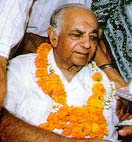Commentary / Mani Shankar Aiyar
How simple it would be if corruption in our society both
originated in and ended with politicians
 The Lakhubhai Pathak case might still become a paradigm for our
times. Here is a millionaire magnate who says he tendered illegal
gratification to an intermediary to get an illegitimate job done,
and that a minister who neither received the money nor did the
job should be held guilty of cheating because he, the minister,
did not tell the bribe-giver to go to hell on being asked if he
would help.
The Lakhubhai Pathak case might still become a paradigm for our
times. Here is a millionaire magnate who says he tendered illegal
gratification to an intermediary to get an illegitimate job done,
and that a minister who neither received the money nor did the
job should be held guilty of cheating because he, the minister,
did not tell the bribe-giver to go to hell on being asked if he
would help.
How simple it would be if corruption in our society both originated
in and ended with politicians. Then politicians could bribe each
other, cheat each other, dupe each other, browbeat each other
and drag each other to court. The rest of us could get on with
the business of earning a clean living. Unfortunately, life is
not as simple as that.
For every bribe-taker, there is a bribe-giver;
for every nepotistic favour done, there is a nepotistic favour
asked. And for every bribe not taken and every act of nepotism
not done, there is a price to be paid for high-mindedness.
Politics without favouritism presupposes a society in which shortages
do not lead to rationing. Take the small matter of making a train
reservation. In the West, few train journeys require reservations
to be made. In India, virtually every train journey requires reservations.
The economic rationale for that is that in the West there are
more berths available than berth-seekers; in India, there are
too many berth-seekers chasing too few berths.
The obvious answer
is to increase the number of trains. That costs money. And although
the number of trains -- and the comforts that go with them --
have vastly increased/improved over the years, the demand for
train services has risen exponentially much faster over the same
period. So, we keep running faster to stay at the same place. What
is to be done?
One solution would be to increase the price of train travel so
that fewer people are able to afford to travel. If the price is
raised sufficiently high, the number of potential passengers would
drop till demand came into equilibrium with supply. Also, railway
revenues would rise so fast that Ram Vilas Paswan, flush with
funds, would be enabled to buy more and better trains. There is
only one hitch though to this scenario. Those who need to travel
will not be able to so so.
Should the train services be run for
those who need to travel -- or for those who can afford to travel
-- or of those who can afford to travel? If your answer is the
latter, then some auxiliary mechanism to the ruthless logic of
the market has to be found. The only possible solution is rationing.
Some technique other than purchasing tickets days in advance of
the journey has to be devised. This is the Headquarters Reservation
Quota.
The dispensing of seats under this quota is an essential
part of the railway minister's job. However fairly he attempts
to do it, at the end of the day discretion has to be exercised
in such a manner that some are bound to find the exercise of such
discretion arbitrary. That is where nepotism comes in and from
nepotism to corruption is but one short jump.
|





 The Lakhubhai Pathak case might still become a paradigm for our
times. Here is a millionaire magnate who says he tendered illegal
gratification to an intermediary to get an illegitimate job done,
and that a minister who neither received the money nor did the
job should be held guilty of cheating because he, the minister,
did not tell the bribe-giver to go to hell on being asked if he
would help.
The Lakhubhai Pathak case might still become a paradigm for our
times. Here is a millionaire magnate who says he tendered illegal
gratification to an intermediary to get an illegitimate job done,
and that a minister who neither received the money nor did the
job should be held guilty of cheating because he, the minister,
did not tell the bribe-giver to go to hell on being asked if he
would help.